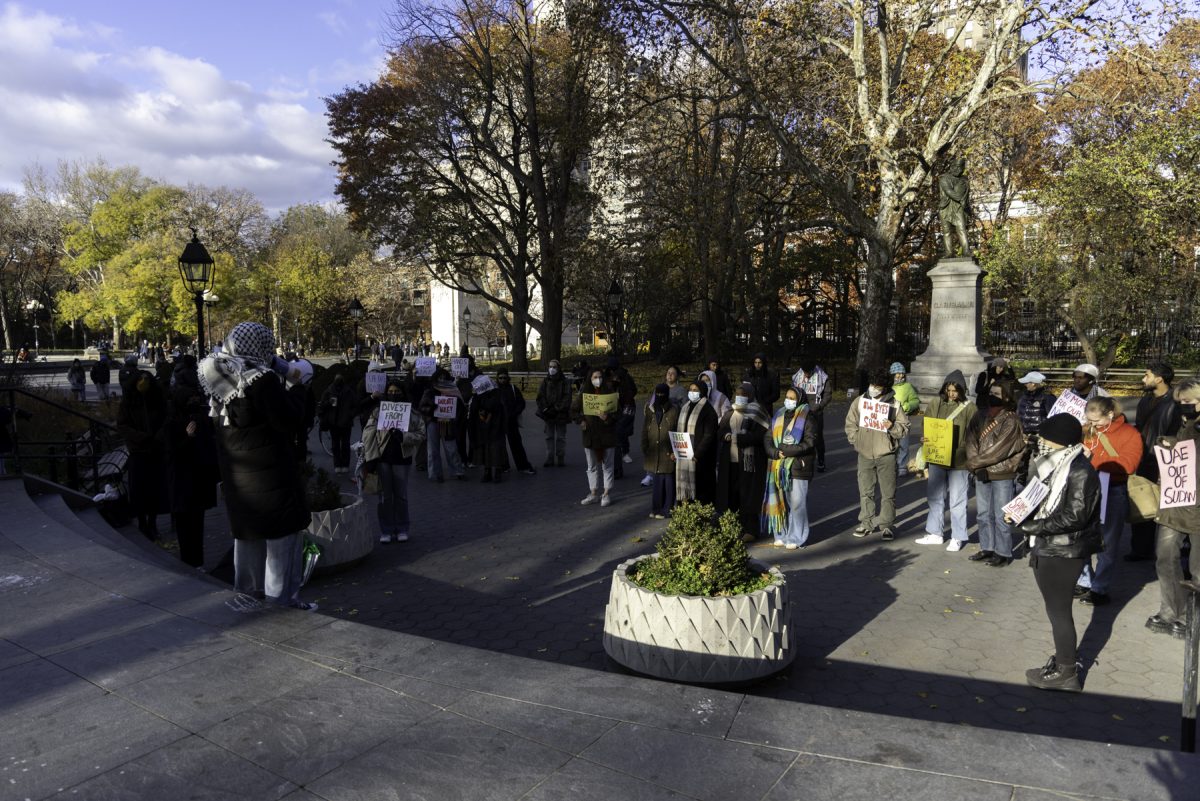Around three dozen students rallied in Washington Square Park on Monday afternoon to protest NYU’s campus in Abu Dhabi, calling for the university to disclose its investments in companies with ties to the United Arab Emirates amid the country’s involvement in Sudan’s civil war.
The rally was followed by a picket outside Bobst Library and a march to the NYU Abu Dhabi headquarters north of the park. Students chanted “UAE funds, NYU gains” and “NYU, you can’t hide, you are on the UAE’s side,” and listed demands for the university to reform its campuses in Abu Dhabi and Tel Aviv.
The United Arab Emirates has faced scrutiny after the Sudanese army accused it of sending weapons to Rapid Support Forces, the paramilitary group that waged initial offenses in Sudan, following a series of investigations into RSF’s military technology and travel history. U.N. sanctions monitors have described the accusations as credible, and U.S. senators introduced bills to halt American weapon sales to the UAE two weeks ago.
In a series of speeches, students from Shut it Down NYU, and the university’s chapters of Students for Justice in Palestine and Students for a Democratic Society, called for a disclosure of NYU’s financial holdings in the UAE. They added that the demand was part of a larger call for fiscal transparency, citing previous requests for NYU to disclose its investments in companies with ties to Israel.
The demonstration’s organizer, an NYU student and organizer with a Sudanese youth group who requested to remain anonymous due to safety concerns, called for the university to establish a humanitarian board to oversee its international expenditures. In an interview with WSN, they said the board would consist of students, staff and administrators who regularly assess where NYU is spending its money.
“I would want to see a blend of folk who are focused on transparency, and a really clear-cut way to look at the university’s financials,” the student said. “The entire message here is checks and balances, so that we are able to regain trust in the administration.”
Demonstrators also requested that the university expand its educational programming in African studies. The student organizer said that in order to accurately represent international history, NYU should employ scholars “not confined to the American education system” who grew up in countries with histories of imperialism. They said that by referencing research-based and personal analyses, the university could rework its academic approach to foreign conflicts.
The group rallied in Garibaldi Plaza for around 45 minutes before marching to Bobst and forming a picket line. At the library, the protest was met with around five additional Campus Safety personnel and three New York City Police Department Community Affairs officers, who briefly intervened when speakers tried to use a megaphone on the sidewalk. The Campus Safety reinforcement followed protesters as they marched to the NYU Abu Dhabi headquarters and stood around 50 feet away.
Students also criticized the university for keeping two of its Board of Trustees members who also hold positions on the Executive Affairs Authority of Abu Dhabi, a government agency that directly advises the UAE president.
“Even if these advisors are not advising the president on topics of energy, topics of defense, topics of foreign intervention, they are still in that very room,” the student organizer said. “They are with the very person who is making these decisions, who is sending these weapons.”
The UAE entirely funds NYU’s campus in Abu Dhabi — a site that has recently raised concern among international human rights groups for its policies restricting pro-Palestinian demonstrations on campus. An August report from Amnesty International alleged that criticism of university leadership could result in prosecution under Emirati laws, and a graduate was deported in May after displaying a keffiyeh during their commencement ceremony. In months leading up to the ceremony, several students and faculty had also reported heightened surveillance of social media postings and escalated restrictions of on-campus demonstrations.
Since the Abu Dhabi site opened, students have claimed the university’s assertion that the campus “enjoys full academic freedom as it exists at NYU New York” does not properly represent conduct expectations at the site. When asked about the campus’ standards of academic freedom earlier this year, an NYU spokesperson had told WSN university leadership ensures that students understand “expectations, obligations and boundaries” of the country in which they choose to study.
Students at the demonstration also referenced violations of workers’ rights under NYU’s labor guidelines during the 2010 construction of the Abu Dhabi campus. Some workers reported living in poor housing conditions and receiving late or no pay, leading the university to claim responsibility for the violations and had said they were committed to changing working conditions. Jesse Pape, an NYU alum who attended the demonstration, said he recalled protests against the site from his time at the university.
“It’s just a lot coming to light,” Pape said. “People are realizing that all these ties, they all play together.”
A university spokesperson did not respond to a request for comment.
Contact Dharma Niles at [email protected].

























































































































































